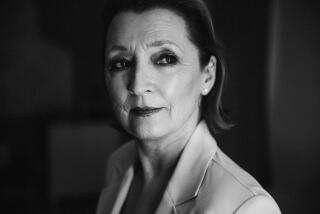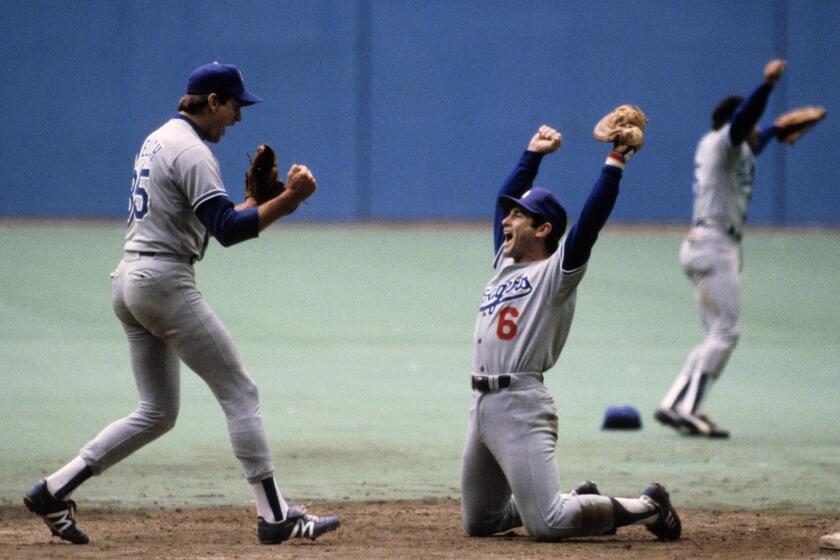This Wonder Never Ceases
CARLSBAD — She is the Dick Clark of the tennis world, an ageless wonder with a magic racket.
At 46, and taking a mulligan in the career that needed none, Martina Navratilova is now beating many players whose mothers are still in their 30s.
She is playing only doubles now, but at a level unheard of for her age. This year, she has already won Grand Slam mixed doubles titles at the Australian Open and Wimbledon, with India’s Leander Paes. That means she has 40 Grand Slam doubles titles, to go with her 18 Grand Slam singles titles.
In a career that ran from 1973 to 1994, and then began again with a comeback three years ago, she won 167 singles and 170 doubles titles, a total of 337 that is certainly more than all the singles and doubles titles of the entire field at this week’s Acura tournament here. If you add up the totals of veterans Lindsay Davenport, Jennifer Capriati, Mary Pierce, Amanda Coetzer, Conchita Martinez, Kim Clijsters and Justine Henin-Hardenne, you get 221. And much of the rest of the field is barely old enough to vote.
The tennis world really took note when Navratilova tied Billie Jean King’s record with her 20th title at Wimbledon. She made a heartwarming speech on court afterward, got a standing ovation and got more attention in the media for a mixed doubles match than ever before.
Wednesday, after teaming with Russian Svetlana Kuznetsova to win her first-round doubles match here, she was asked if she is still on a high from Wimbledon.
“I’m on a high just playing the best I can,” she said.
On a day that yet another top player, Capriati, had to default a match with an injury -- meaning that five of the top seven women players in the world are now either out with an injury or playing with a serious one -- the irony of a nearly 50 woman looking fit and attracting a large crowd was hard to miss.
Of the four players in her match, including partner Kuznetsova, 18; Silvia Farina Elia, 31, of Italy, and Barbara Schett, 27, of Austria, Navratilova looked the most fit and was clearly the best player. With her sleeveless shirt emphasizing the definition in her arms and her cap occasionally turned backward like some 16-year-old skateboarder, she took over the net early and thrilled the crowd with her quick poaches and reaction volleys. It was strange doubles that had three players banging away from the baseline and Navratilova eventually stepping in at the net to end the point.
“The other players don’t like the net because they don’t volley well,” Navratilova said. “I am the best [women’s] volleyer ever in the game.... I love being at the net.”
The 6-2, 6-0 victory by Navratilova-Kuznetsova was certainly not a matter of youth prevailing. More like youth didn’t have a clue. Kuznetsova banged away from the baseline all day, and Elia and Schett approached the net as if it were woven with live rattlesnakes. In a game that is designed to be won or lost at the net, the first attempt at a poach by Elia came at 2-6, 0-5, love 30.
“They play differently these days,” Navratilova said, rolling her eyes.
Navratilova is a stunning exception in a sport that is known for players who learn to say hello when it is time to say goodbye. She has never quite said goodbye, and the sport is better for it.
Her news conferences are analytical, her maturity refreshing and her candor hard to match.
Last year, she not only played here, but also used her time to hunt down Nick Canepa, sports columnist for the San Diego Union-Tribune, who had written a column a few weeks earlier taking her to task for some anti-George Bush quotes in a German newspaper Die Zeit. Among those quotes was the following: “The most absurd part of my escape [from Czechoslovakia] is that I have exchanged one system that suppressed free opinion for another.”
Canepa urged that, if she didn’t like it here, to not “let Lady Liberty kick you in the behind on the way out of the harbor.”
Most athletes whine and talk about being misquoted and bad-mouth reporters but never confront anybody. Navratilova got Canepa to come to the tournament, sat him down and had a great talk.
“We talked for half an hour, and she explained that things she had been quoted on weren’t exactly what she said,” Canepa recalled Wednesday. “Then she asked me if I had ever been around German reporters. I said yes, at the Olympics, and then I began to see her point.
“She’s still one of my favorite athletes. I like how candid she is, how she handles things.”
*
When fifth-seeded Capriati was forced to default with a sore serving shoulder at 1-4 of the first set to Elena Likhovtseva of Russia, she joined a list of the Women’s Tennis Assn. wounded that now includes Venus and Serena Williams, and Amelie Mauresmo of France, currently not playing because of injuries, and Davenport, struggling along in this event with a toe that has painful nerve damage. That leaves two of the top seven players in the world, Clijsters and Henin-Hardenne, the only injury-free ones in the top seven. Must be something in the water in Belgium.
Clijsters, seeded second but the highest remaining seeded player with Serena Williams’ last-second withdrawal, advanced in a rain-delayed evening match, beating Virgina Ruano Pascual of Spain, 6-2, 6-0. Also winning Wednesday were unseeded Pierce over Martinez, 6-1, 6-3, and seventh-seeded Daniela Hantuchova of Russia, 3-6, 7-5, 7-6 (6) over Katarina Srebotnik of Slovakia. Hantuchova faced one match point, at 5-6 of the tiebreaker, and erased it with an ace.
More to Read
Go beyond the scoreboard
Get the latest on L.A.'s teams in the daily Sports Report newsletter.
You may occasionally receive promotional content from the Los Angeles Times.











